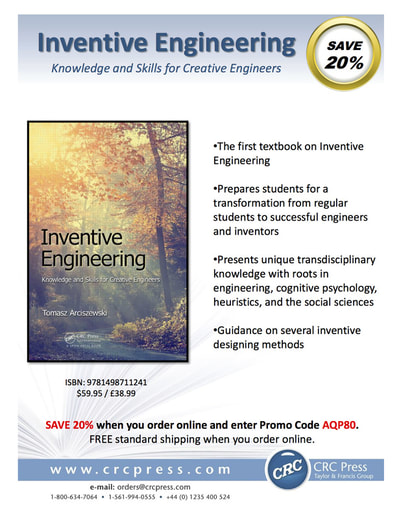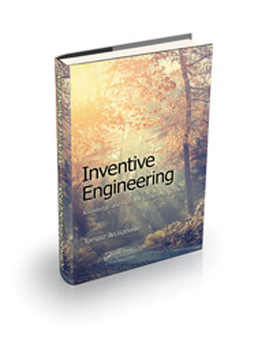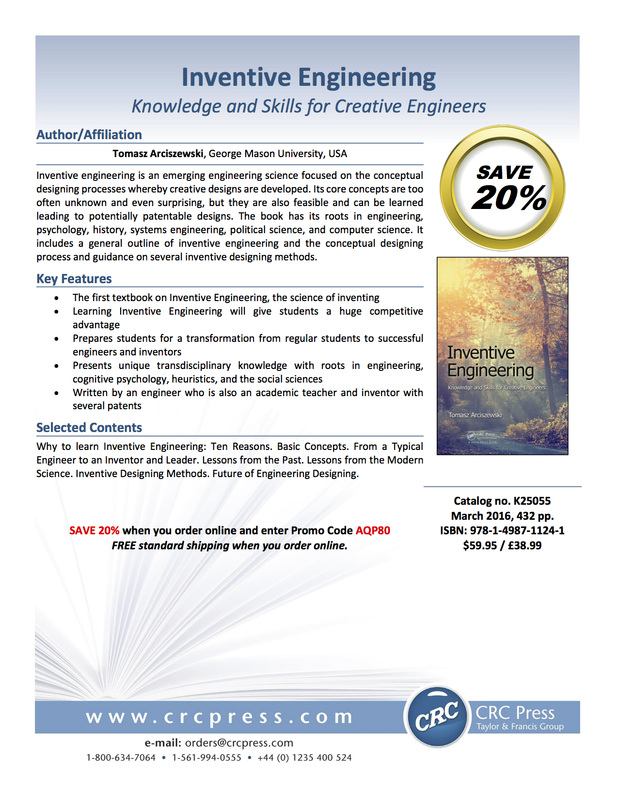Book Description
Arciszewski has been studying, practicing and teaching Inventive Engineering for the last 45 years. As a result of that he has discovered a secret, which is the key to becoming an inventive engineer. This secret has compelled the Author to write this book. Learning about the methods is necessary, but grossly insufficient. A student must undergo a transition from an analyst (specializing in solving analytical problems) to a person also capable to develop new engineering ideas, or inventions. This transformation requires understanding the process and acquiring a balanced body of knowledge, including not only knowledge about methods but also the Author’s unique integrated knowledge with roots in several domains. This second kind of knowledge is absolutely critical to motivate the student and to prepare him/her for the most important transition in life. The book answers three fundamental questions: “Why to learn Inventive Engineering?” (Chapter 1), “What is the fundamental knowledge behind Inventive Engineering and what is our new science?” (Chapters 2 through 5), and finally “How to practice Inventive Engineering?” (Chapters 6 through 10). The book has roots in engineering, systems science, cognitive psychology, heuristics, history, and political science. The presented knowledge is integrated as a result of the Author’s years of interdisciplinary studies and cooperation with many scholars in various areas. Excerpt from Book Foreword "Ours is a rapidly evolving profession—one that demands a high level of specialized knowledge and a voracious intellectual appetite capable of keeping pace with technological advances. Perhaps the most critical attributes to seek and nurture are our ability to lead effectively, act ethically, communicate clearly, and manage efficiently. Engineers who possess these skills will not only enjoy greater personal success, but also make more meaningful contributions to their businesses, and to society as a whole. Beyond what we know, Arciszewski invites readers to consider why our expertise matters, and how we approach these changing demands. Knowledge is the bedrock but fertile imaginations are the topsoil where innovation takes root. Creativity, and the ability to apply knowledge in novel ways, become differentiating factors in the talent marketplace. Arciszewski continues to advance this vital conversation about the future of engineering, with clear writing, compelling ideas and practical advice. At the same time, he continues to fearlessly color outside the lines, inviting us to see the big picture from a new perspective. He invites engineers to be as creative as we are analytical. He embraces a refreshingly holistic approach, asking us to focus first on rewarding and creative work that fuels personal satisfaction and genuine happiness. Arciszewski coined the name “Inventive Engineering” in the 1990s. The name reflects a new way of framing deeply-rooted concepts for a modern era. In his typical style, Arciszewski offers a comprehensive explanation of how this term found its way into the modern lexicon of professional engineering, examining its roots in cognitive, philosophical, and biological underpinnings. He traces the lineage of inventive engineering from ancient Asia to the European Renaissance, and from the writings of Greek philosophers to the works of futurist Richard Florida. In a demonstration of boundary-spanning thought leadership, Arciszewski invites readers to think more broadly about our profession. He challenges us to demand more of ourselves and those we prepare for careers in engineering, and expands our lexicon with language and ideas that need to become more commonplace in engineering. Everyone who reads this will interpret the words and ideas with different point of view. All will be invited to lift their noses out of the blueprints, seek opportunities for experimentation and think about ways we can seek better ways to serve humanity." Jeffrey S. Russell, Ph.D., P.E., Dist.M.ASCE, NAC, F.NSPE Vice Provost for Lifelong Learning Dean, Division of Continuing Studies Professor of Civil and Environmental Engineering University of Wisconsin-Madison |



